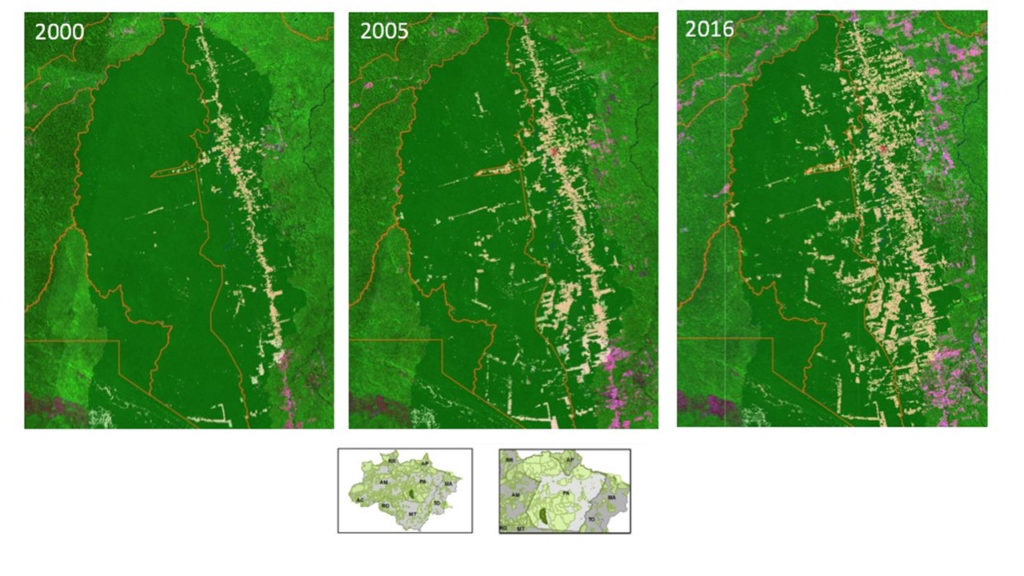His Excellency President of Brazil, Michel Temer,
The Brazilian Coalition on Climate, Forests and Agriculture – movement formed by civil society representatives, the business sector and the academic community – requests to the President of the Republic to veto the provisional acts 756/2016 and 758/2016. These provisional acts approved by the Senate plenary on May 23rd (bills 4/2017 and 17/2017) reduced the Jamanxim National Forest (Flona), in the municipality of Novo Progresso (PA), the National Park (Parna) of Jamanxim, in the municipalities of Itaituba and Trairão (PA) and the Parna of São Joaquim (SC).
The approval of these provisional acts goes against the protection of the environment and the battle with the growing deforestation in Brazilian biomes. Moreover, it compromises the credibility of the necessary economic development initiatives in the country. These acts bring irreparable damage to biodiversity and climate and will benefit a few individuals at the expense of the national interest.
The approval of these laws will withdraw the protection of 588.5 thousand hectares of forests in the Amazon and cause the reduction of 20% of Parna de São Joaquim, one of the main refuges of the Atlantic Forest biodiversity, the most threatened biome in the country. It will result in increased illegal exploitation and depredation encouraged by the highest authority of the Republic, creating an undesirable precedent for new occupations of areas preserved in Conservation Units (Unidades de Conservação, UCs).
Jamanxim Flona, created in February 2006, along with other UCs, has an important role in the region and form a green barrier with more than 6.4 million hectares. This initiative managed to contain the overwhelming advance of deforestation along the BR-163 – a highway that connects Cuiabá (MT) to Santarém (PA) – which increased by more than 650% between 2001 and 2004, as a result of the acceleration of speculation Real estate of public lands.
Sectors that defend the approval of the reduction of these invaluable protected areas argue that the difficulties faced by the government to implement this protection prevented the effective control of illegal and predatory exploitation caused by deforestation and mining. However, reducing them is the worst way to try to solve the problems, which will actually worsen without legal protection. The analysis of the images obtained by the MapBiomas platform show the very high risk to which these areas will be submitted. These maps show that from 2004 to 2016 Jamanxim Flona lost more than 117 thousand hectares of forests, which released 70 million tons of carbon dioxide in the atmosphere according to calculations by the Environmental Research Institute of the Amazon (Instituto de Pesquisa Ambiental da Amazônia, IPAM). By 2030, the reduction of these areas can result in 280,000 hectares of less forests and in the emission of 140 million tons of CO2. This process needs to be avoided.
It is important to point out that the ICMBio, a federal body responsible for the management of UCs, has acknowledged in a report that the occupation of Jamanxim Flona is recent, stating that 67.7% of the occupants arrived there just before or shortly after its creation, in 2006. This data proves that the occupations had a speculative character.
Other legislative and executive proposals threaten the Amazon Region Protected Areas Program (Programa Áreas Protegidas da Amazônia, ARPA), which supports the UCs management in the region. The use of resources in ARPA (about US$ 215 million from international donors) is tied to a number of commitments, such as the maintenance of protected areas. Thus, the Government projects aimed at reducing, recategorizing and altering the limits of conservation units clearly disregard a Brazilian commitment, which may affect the investments of one of the world’s largest programs of forest conservation in history.
The provisional acts approved by the Senate will affect legal security and will undermine investments in the country, moving away demanding investors and consumers of sustainable production systems. In a world in which socio-environmental criteria are increasingly at the heart of decision-making processes of large investors, Brazil is moving away from the possibility to become a competitive and respected economy.
In a scenario of intensified deforestation in Amazônia in the last two years, provisional acts such these ones stimulate predatory occupation and disregard for environmental protection areas, jeopardizing gains obtained in attempts to control deforestation in the region, and damage the image of the country and agribusiness.
Land regularization of areas with illegal deforestation can not be authorized by the Government. Otherwise, it will not be feasible to stop illegal deforestation, as expected by the Brazilian Forest Code, or to comply with the international climate and biodiversity agreements assumed by the country, such as the NDC implementation, which is fundamental for the development of a low carbon economy.
Brazil needs a national policy to address the challenges of illegal occupation and deforestation and to guarantee sustainability for the logistic projects in the Amazon, as in the case of Ferrogrão. The handling of these bills in Congress has not been successful and associates the railroad with unnecessary damage to the forest, biodiversity and climate. This drives out investors and may result in judicial inquiries. It is necessary to resume this debate, with technical bases and broad stakeholder participation.
The first step in this direction, President, is, in our view, the integral veto of the bills 04/2017 and 17/2017.
Brazilian Coalition on Climate, Forests and Agriculture
Deforestation growth in Jamanxim National Forest from 2000 to 2016
